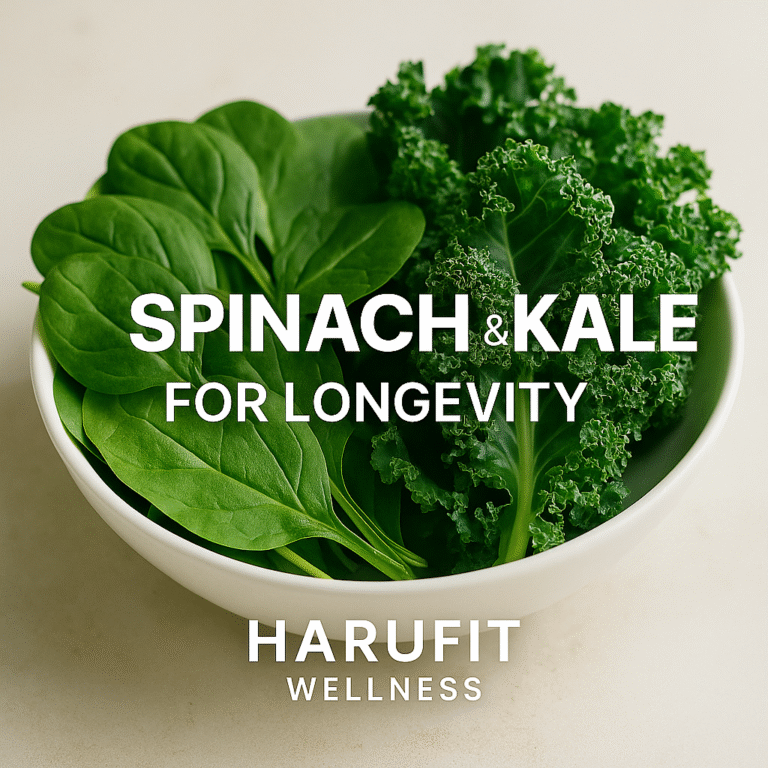
Spinach and kale are nutrient-rich greens that support healthy aging, vitality, and long-term wellness.
As an Amazon Associate I earn from qualifying purchases.
This post may contain affiliate links which means I may receive a commission for purchases made through links.
The Power of Leafy Greens: Spinach and Kale for Longevity
Most people searching for longevity secrets overlook what’s already in their kitchen.
While expensive supplements and trendy diets grab headlines, two humble vegetables have been quietly proving their worth in laboratories worldwide: spinach and kale.
These aren’t just ordinary greens. Research shows they pack compounds that can literally slow down brain aging by over a decade.
If that sounds too good to be true, let me walk you through what scientists have actually discovered.
Why These Two Greens Stand Apart
Spinach and kale belong to different plant families. This means they bring unique nutritional profiles to your plate.
Kale contains about three times as much vitamin C as spinach and collard greens.
Spinach delivers higher levels of folate and is gentler on your digestive system.
Think of them as complementary partners rather than competitors.
- Spinach offers easily absorbed nutrients in a mild package
- Kale provides more robust antioxidant firepower with its slightly bitter edge
What Makes Them Special for Longevity:
Spinach delivers:
- Folate (brain protection)
- Lutein (eye and cognitive health)
- Magnesium (muscle and sleep support)
Kale brings:
- Vitamin K (bone strength)
- Sulforaphane (cellular detox)
- Calcium (stronger bones)
Both contain nitrates that help your blood vessels stay flexible and strong – crucial as we age.
The Brain Research That Changes Everything 🧠
Here’s where things get remarkable.
A study published in Neurology found that older adults who ate at least one serving of leafy green vegetables showed cognitive abilities equivalent to being 11 years younger.
The Study Details:
- Nearly 1,000 participants
- Tracked for up to 10 years
- Monitored eating habits + mental sharpness
- Result: Those eating 1.3 servings of leafy greens daily maintained better memory and thinking skills
The protection comes from neuroprotective actions of:
- Lutein
- Folate
- β-carotene
- Phylloquinone
These nutrients work together, creating a biological shield around your brain cells.
Beyond Brain Power: Full-Body Benefits
While cognitive protection gets the spotlight, these greens deliver comprehensive health advantages:
Heart Health ❤️
Spinach can help prevent insulin resistance. Its nitrate content:
- Increases NO status
- Improves lipid balance
- Reduces inflammation
- Boosts blood vessel function
Kale’s potassium helps regulate blood pressure naturally.
Bone Strength 🦴
- One cup of cooked spinach = over 400% of daily vitamin K needs
- Kale provides impressive calcium content
- Together = stronger bones with every serving
Disease Prevention 🛡️
LC-MS/MS screening identified:
- 69 compounds in spinach
- 103 compounds in kale
Including flavonoids, glucosinolates, and phenolic acids that research links to reduced chronic disease risk.
→ Discover more disease-fighting foods in our Anti-Aging Nutrition Series
Real Ways to Eat More (Without Forcing It)
The key is making these greens so convenient that eating them becomes automatic rather than effortful.
Morning Strategy ☀️
Throw a handful of spinach into whatever you’re already making:
- Scrambled eggs
- Smoothies
- Breakfast sandwiches
You’ll barely taste it, but your body gets the nutrients.
Midday Approach 🥗
Try the “massage technique” with kale:
- Drizzle olive oil and lemon juice on raw kale leaves
- Massage with your hands for 30 seconds
- This breaks down tough fibers and makes them enjoyable to eat
Evening Options 🍽️
Both greens work beautifully:
- Sautéed with garlic as a side dish
- Wilted into soups during last few minutes of cooking
- Mixed into pasta dishes
For Busy Lifestyles 💊
If fresh greens aren’t always practical, quality supplements can bridge the gap:
Organic Kale Powder Supplement –[affiliate links] provides concentrated nutrients in one scoop – perfect for travel or hectic mornings.
Green Superfood Blend –[affiliate links] combines spinach, kale, and other nutrient-dense greens for comprehensive daily nutrition.
What Science Actually Shows (The Honest Version)
Let me be clear about what we know versus what we hope.
The research shows strong associations between eating leafy greens and better health outcomes. But these are observational studies.
Scientists can establish correlation but not necessarily causation between eating greens and cognitive benefits.
The Bottom Line:
The evidence is compelling enough that researchers recommend adding daily servings of these vegetables to support brain health.
When you consider:
- ✅ Minimal risk
- ✅ Substantial potential benefits
It’s a practical choice.
Making It Sustainable
Centenarians in Blue Zones regions have made leafy greens a fundamental part of their daily diets.
But they didn’t start by forcing down massive salads. They integrated greens into meals they already enjoyed.
Start Small:
- Maybe it’s spinach in your morning eggs twice this week
- Or kale chips as a crunchy afternoon snack
- The goal isn’t perfection – it’s building a habit that sticks
Your future self will appreciate every serving you choose today.
After all, these vegetables contain an abundance of:
- Fatty acids
- Amino acids
- Organic acids
- Vitamins
- Minerals
Research suggests these can reduce the risk of many chronic diseases.
The Simple Truth
The power of leafy greens isn’t complicated.
It’s simply consistent nutrition that supports your body’s natural ability to age well.
Two vegetables. One daily serving. Potentially years of cognitive advantage.
That’s a pretty good return on investment for something that grows in the ground.
Affiliate Disclosure: This post contains affiliate links to Amazon products. As an Amazon Associate, I earn from qualifying purchases at no additional cost to you. I only recommend products I believe can genuinely support your health journey.



Comments